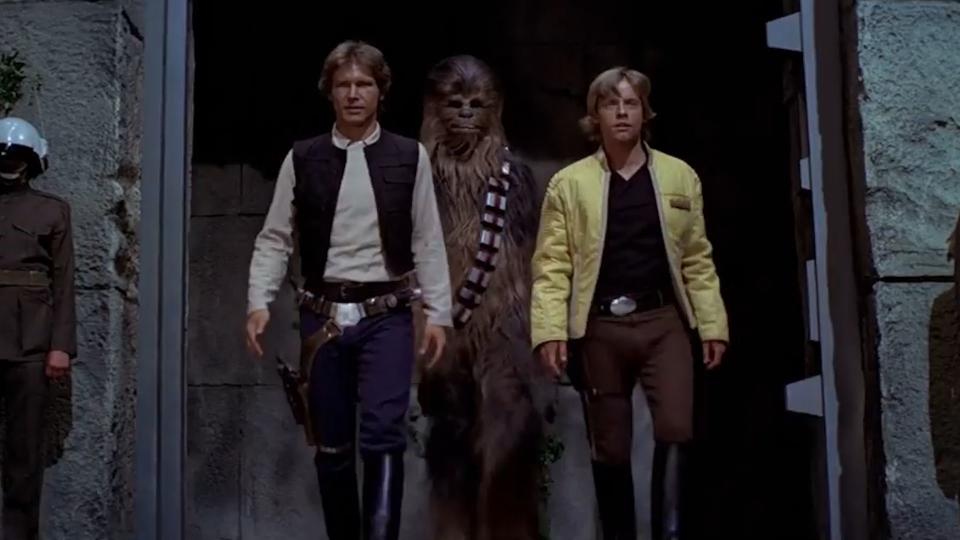Star Wars droids will never be the same after 'Solo'

Spoilers for Solo: A Star Wars Story ahead.
Every Star Wars movie has its quirky droid, and Solo: A Star Wars Story is no exception. But Phoebe Waller-Bridge's L3-37 stands out in a couple of ways.
For one thing, she's a female droid – a rarity in Star Wars. Though not technically the first, she is the first with more than a walk-on role.
SEE ALSO: Who's who in 'Solo: A Star Wars Story'
For another, she's obsessed with droid rights. And her crusade opens up a whole new can of worms that Star Wars may come to wish it had left untouched.
L3 is a different kind of droid
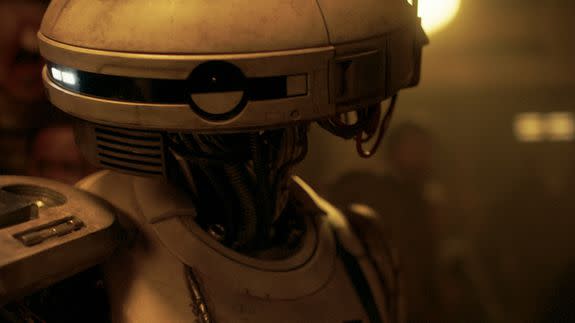
Image: Lucasfilm
From her first scene, L3 makes clear that she's outraged by the shoddy treatment of droids, and committed to the cause of righting that wrong.
We first see her pleading with two droids in a cage match to stop letting themselves be exploited for others' entertainment -– at a bar which, she notes, won't even serve their kind.
L3 asserts her unusual independence in other ways. She gives as good as she gets with Lando, her human partner, mocking the idea that he could be her "master" and jokingly daring him to wipe her memory. This is how they flirt, apparently; she later claims that Lando has unrequited romantic feelings for her, and hints that they've hooked up in the past. ("Oh, it works," L3 tells Qi'ra, slyly.)
She's fierce and funny, a rebel hero in the classic Star Wars mold – an underdog who'll stick up for the oppressed and overlooked. In the end, L3 goes out in a blaze of glory: She dies in action after sparking a full-fledged revolt on Kessel by removing the restraining bolts from the droids in the mines.
But wait. If L3 is the good guy, refusing to accept a status quo that sees her and her kind as second-class, then what or who is she up against?
Star Wars droids are slaves
The question of droid personhood has long been an awkward one in Star Wars lore. There's never been any question that Star Wars' droid characters are capable of thought and emotion to the same extent that Star Wars' human and alien characters are.
It's also clear that they are considered property. Heck, the first time we meet our hero Luke Skywalker, his uncle is literally buying C-3PO and R2-D2 (to say nothing of poor R5-D4, the droid with the bad motivator) from a bunch of Jawas.
This sort of thing has led some experts to declare that Star Wars droids are slaves. There's just no other way to describe it. They're sentient beings who are widely considered to be the property of other sentient beings.
What would you call that system?
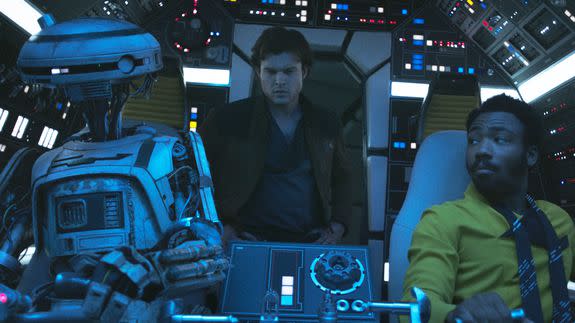
Image: Lucasfilm
Prior to Solo, though, it was easy enough to shrug off this uncomfortable fact. After all, C-3PO and R2-D2 never seemed to mind being owned by Luke. Threepio went through serious dismemberment, but also accepted that suffering was his "lot in life." If BB-8 resents Poe Dameron's control over him, he hasn't expressed it so far. Even K-2SO from Rogue One, the sassiest of Star Wars droids, grudgingly followed orders. Cassian said he had to.
Not all droids were treated that well, to be sure. There were some real wrecks on the Jawa sandcrawler and in Jabba's palace. But when their subjugation existed in the background, it was obscured by our need to keep the story moving.
Besides, who was to say there wasn't a perfectly reasonable in-universe explanation for these droids' subjugation? Maybe they like it. Maybe droids are built to be incapable of independence. Maybe all the droids in the galaxy sign some sort of consent form when they're powered up.
Maybe they're actually less like people and more like pets, and therefore it's kind of okay that they have owners and minds of their own.
Who has time to get into all this, anyway, when the plot's moving this fast? Star Wars basically Jedi Mind-tricked us into looking the other way.
Now here comes L3 — proof that at least some droids are self-aware enough to prefer independence, and expressive enough to demand it loudly and repeatedly. She also proves that droids can survive without masters –- she's never had one, and she seems to be doing fine.
With L3, Solo tiptoes into a long line of stories about sentient AI, from 2001: A Space Odyssey to Blade Runner to Ex Machina. It pokes at some of the same issues as those classics: How do we decide what is a machine, and what is a person? What rights do sentient artificial beings have? How do they feel about submitting to us?
Where those films grasped for answers, Solo barely even notices the questions. L3's equality campaign is reduced to a lighthearted subplot, apparently unaware of the troubling implications surrounding it raises.
An inconvenient intergalactic truth
If Star Wars droids are slaves – and after Solo, it seems impossible to see them any other way – it follows that their owners are, well, slave owners. And that includes many of our heroes.
You like Queen Amidala? Poe? Cassian? "Master" Luke? Sorry, all your faves are problematic. Leia didn't own Artoo, but press-ganged him into military service nonetheless. Obi-Wan couldn't recall ever owning a droid? That turned out to be another Kenobi fib.
Sure, as far as droid owners go, our heroes are nice. They treat their droids with care and consideration. But none of our heroes have ever gone so far as to free a droid, or even paid lip service to the cause of droid rights. (You could argue a villain has, however: Anakin Skywalker, later Darth Vader, claimed he'd make sure his creation Threepio wouldn't be sold when Anakin left Tatooine.)
That makes for a rather uncomfortable tension with the Rebel and Resistance missions to fight for freedom against a tyrannical Empire. The good guys in Star Wars take issue with the enslavement of both humans and aliens. There's a whole sequence in Solo where Chewbacca unshackles his fellow Wookiees. Yet the enslavement of droids remains a blind spot.
Even the characters who don't own droids seem to view them as something less than human. Lando may not own L3, but he assures his colleagues that he could have her mind wiped. He just doesn't want to, because it happens to contain a useful navigational database.
He drags her to bars that don't serve her kind, and seems to see droid rights as her pet project rather than anything he is invested in.
In other words, he's a really bad ally.
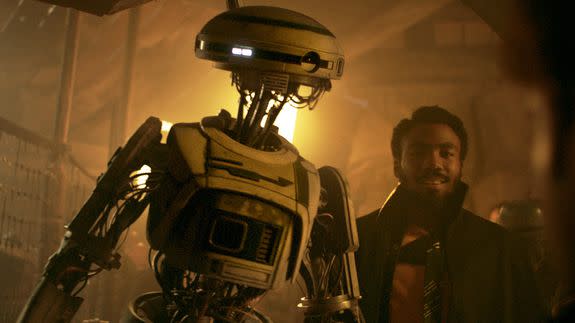
Image: Lucasfilm
So, for that matter, is the movie. Solo plays L3's fight for droid rights as comic relief, rather than an earnest campaign for justice. It's cute that she's so worked up on the subject, but there's never a suggestion that any human is taking it seriously. Lando all but rolls his eyes when she brings up the topic, and none of the other characters really engage with her on the issue.
Her gender adds another awkward wrinkle. It's difficult not to notice that this rare female droid is basically the droid version of a feminist – fed up with her second-class status and fighting for equal rights. The other characters find her anger amusing, annoying, or puzzling, but never inspiring or thought-provoking.
Even when L3 gets her revolt, it's just a side mission in service to another operation. And when she dies in the process, it's framed as a big moment for, uh, Lando, raising the emotional stakes for Captain Calrissian and wiping that self-assured smirk off his face.
We never do learn what comes of the uprising that L3 started on Kessel, or the other droids that participated in it. Why bother, when her activism was only ever a fun little detail meant to give her personality some zing?
How about that Black Mirror twist?
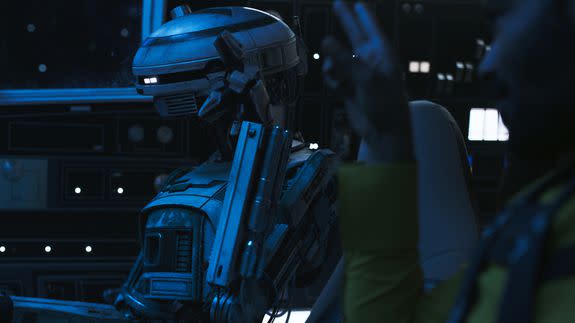
Image: Lucasfilm
But Solo's questionable treatment of L3 isn't over yet. In a final, horrifying twist, Lando uploads L3's mind into the Millennium Falcon, so it can access her navigational smarts and get the crew out of a pinch.
If this is something L3 would have wanted, no one mentions it. If we're meant to infer that her data was transferred, but not her consciousness, no one says that either.
Thus a droid defined by her outspokenness, her independence, and her rebellious spirit, is reduced to a silent and submissive program whose only purpose is to serve the organic lifeforms aboard the ship. Her concerns about equality are hand-waved away; questions about consent and free will are shoved to the wayside.
What's more, L3 is eventually abandoned by the character she loved best. At the very end of Solo, Lando bets the Millennium Falcon, and by extension L3, in a game of Sabacc, and forever loses her to Han. "She belongs with me," Han says. While he's probably talking about the Falcon, that "she" could refer to L3 as well.
L3, then, is left to wait out the rest of eternity trapped in a network under the ownership of a man she barely knows. I'm reminded of the "Black Museum" episode of Black Mirror, in particular —spoilers for a 5-month-old episode of television — that haunting image of a woman trapped inside the head of a teddy bear.
Now it is no longer cute that C-3PO finds the Falcon's dialect "peculiar" in Empire Strikes Back. It's actually sickening, since we know he's talking about a voice that once cried out and was silenced.
Should Star Wars lean in to its droid issues?
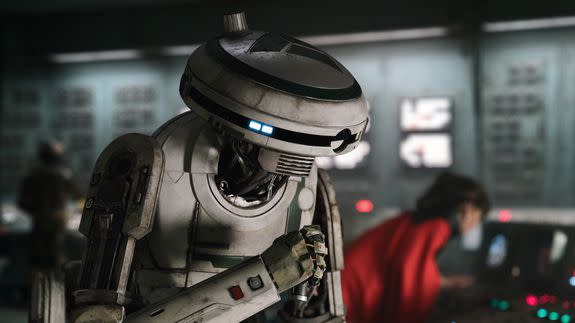
Image: Jonathan Olley /Lucasfilm Ltd.
Granted, this is very heavy subject matter. There's no indication that the lighthearted Solo would have been capable of bearing its weight.
Perhaps it's for the best that the writers, Jon and Lawrence Kasdan, didn't really try. A discussion of slavery and artificial intelligence could have gone awry real quick, in a movie that mostly just wants to remind you that you love Han Solo.
On the other hand, they started it.
L3 wasn't canon before Solo. She didn't have to be here. By introducing this character, the filmmakers have invited the conversation about droid rights.
Now that it's out there, we find it harder to look at C-3PO without wondering what he thinks of droid liberation, or whether BB-8 feels any sort of way about his second-class status.
L3's crusade also resonates with similar themes in other Star Wars movies. The Canto Bight sequence in The Last Jedi revealed that this is a galaxy built on the backs of the poor and unlucky, while Finn is proof that some stormtroopers can free their minds of Imperial dogma.
Droid rights should fit neatly into the franchise's broader concerns about oppression and freedom and the fight for fairness. Dismissing it contradicts those messages.
But engaging with it would give Star Wars the opportunity to tell a different kind of story – a nuanced one about how the oppressed (i.e., the rebels) can also be the oppressors, and about how those with privilege (i.e., humans and aliens) can wield it for good.
Tell that story properly, Lucasfilm, and you'll make sure L3 did not die in vain.
WATCH: In honor of 'Solo' hitting theaters, we talked about what makes Star Wars so magical
